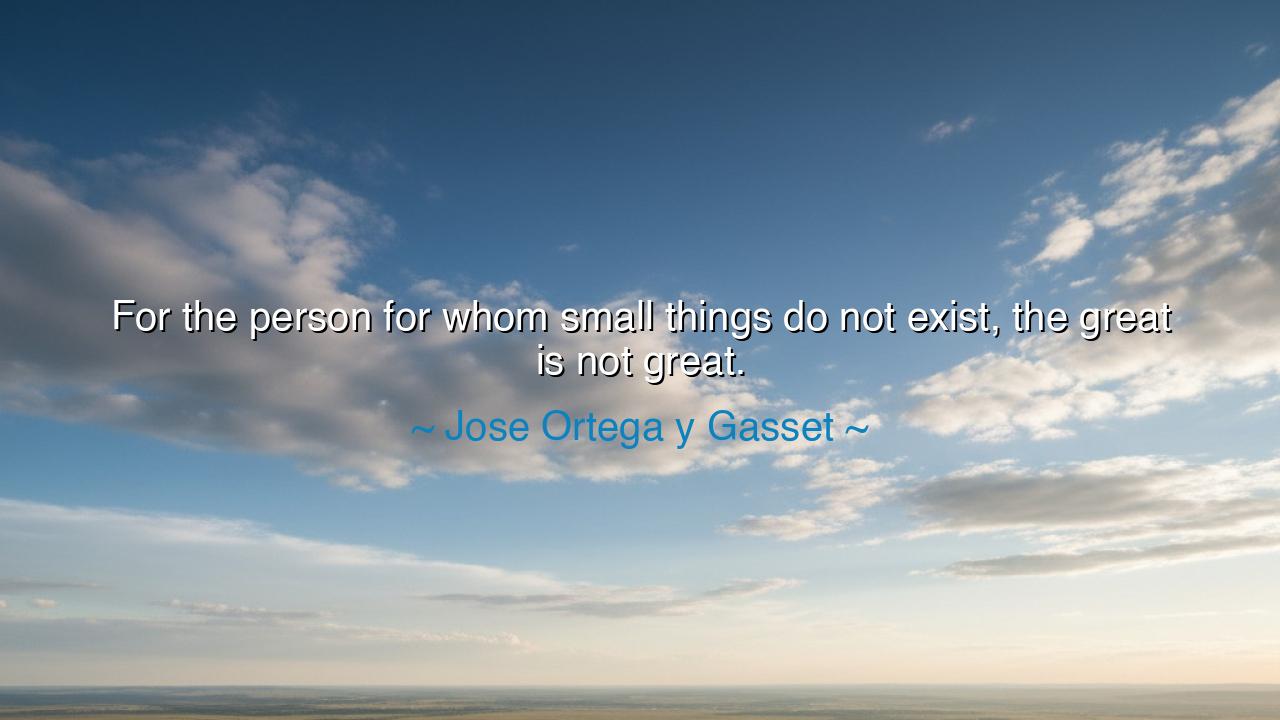
For the person for whom small things do not exist, the great is






“For the person for whom small things do not exist, the great is not great.” — José Ortega y Gasset.
Thus spoke Ortega y Gasset, the philosopher of Spain, whose insight pierces the vanity of mankind and reminds us that greatness is not born in the grand, but in the humble. In this single line, he unmasks the illusion of those who chase glory yet scorn the quiet details of life. The one who cannot see wonder in the small will never grasp the meaning of the vast. For the great is only an accumulation of small things, gathered with care, attention, and love. The mountain is made of stones, the river of droplets, and the symphony of single notes. To despise the small is to be blind to the divine pattern that builds all things.
In the ancient days, the wise understood this truth. The craftsman who carved temples in marble began not with grandeur, but with a single stroke of the chisel. The scribe who preserved sacred texts wrote line by line, word by word, with reverence. And the philosopher, before shaping nations with ideas, learned first to discipline his thoughts, to attend to the smallest truths of daily living — kindness, patience, silence. For they knew that the great is born from the attentive care of the small, and that he who rushes toward glory without reverence for detail will achieve nothing but shadow.
Consider the life of Leonardo da Vinci, whose genius spanned the heavens and the earth. He studied the flight of birds, the curl of water, the anatomy of a leaf. It was his devotion to small things, to the ordinary miracles of nature, that allowed him to conceive of machines, paintings, and ideas centuries ahead of his time. To the impatient, such observation seemed trivial — but Leonardo knew that in each tiny motion, the infinite revealed itself. Had he not loved the detail, the great would never have followed.
So too in the moral realm. The person who seeks to be virtuous in grand gestures but neglects small kindnesses is a counterfeit of the good. It is easy to speak of justice in the public square, but harder to be gentle to a servant, or patient with a child. Yet it is there, in the uncelebrated moments, that the true strength of character is forged. The great souls — Francis of Assisi, Mother Teresa, Nelson Mandela — were first masters of the small: a kind word, a listening ear, a steady heart. From such daily acts grew movements that reshaped the world.
Ortega y Gasset spoke also as a critic of the modern spirit — a spirit that seeks only spectacle, that confuses noise with meaning and scale with worth. He saw that in forgetting the small, humanity was losing its sense of proportion, its capacity for gratitude. We build towers but forget to tend the garden; we chase fame but neglect friendship. The result is emptiness — for greatness without foundation collapses. The great can only endure when it rises from a heart that honors the small.
Therefore, the lesson is clear: reverence begins in the details. Do not wait for great opportunities to show your strength. Polish your small tasks, honor your daily work, cherish the unnoticed moments. The one who sweeps a floor with care is nearer to wisdom than the one who dreams of ruling the world. Every act done with attention becomes sacred. When the heart learns to love the small, it is ready to receive the great — for the same divine hand that moves the stars also paints the veins upon a leaf.
So, let this truth dwell in your spirit: If you cannot see the beauty in the small, you will never hold the greatness you seek. Look upon the world as the ancients did — as a temple made of infinite details, each worthy of wonder. For the secret of mastery, of virtue, of greatness itself, is hidden not in the thunder of the mighty, but in the whisper of the minute. Honor the little things, and life will reveal to you its boundless depth. For in the smallest drop of water lies the reflection of the whole sky.






AAdministratorAdministrator
Welcome, honored guests. Please leave a comment, we will respond soon